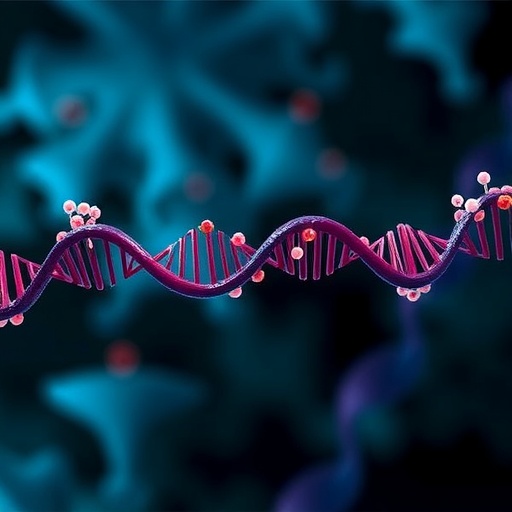Recent advancements in cancer genomics have unveiled the intricate role that selenoproteins play in hepatic cellular mechanisms, particularly in the context of hepatocellular carcinoma (HCC). In a groundbreaking study published in Biochemical Genetics, researchers led by Alves and colleagues scrutinize the variability within selenoprotein genes among HCC patients. This research not only underscores the genetic nuances that can affect disease progression but also holds potential implications for personalized therapeutic strategies.
Selenoproteins are a unique class of proteins that incorporate selenium, an essential trace element. It is widely acknowledged that selenium plays a significant role in redox regulation and antioxidant defense, crucial for maintaining cellular integrity in liver tissue. The variability in selenoprotein genes, as detailed in this study, could illuminate new pathways through which HCC develops and progresses. The insight gained from understanding this genetic variability offers a potentially transformative approach to cancer research and treatment.
The investigation conducted by the research team harnesses advanced genetic sequencing technologies to delve into the allele variations of selenoprotein genes in individuals diagnosed with HCC. By comparing the genetic data from patients with varying disease stages, the study highlights correlations between specific gene variants and the clinicopathological features of HCC. Such correlations are essential for understanding not only how HCC arises but also how it may respond to different treatments based on genetic predisposition.
One of the pivotal findings of this study is the association of certain selenoprotein gene polymorphisms with enhanced susceptibility to liver cancer. By elucidating these connections, the authors draw attention to the potential for utilizing selenoprotein genomics as a biomarker for HCC risk assessment. This is particularly important in populations at a higher risk for liver cancer due to underlying conditions such as viral hepatitis or alcohol-related liver disease.
Moreover, the study emphasizes the influence of environmental factors on the expression of selenoprotein genes in HCC patients. Selenium intake, combined with genetic predispositions, creates a complex interplay that could modulate the severity and progression of the disease. The authors suggest that understanding these interactions could pave the way for dietary interventions that may bolster selenoprotein synthesis, thereby improving patient outcomes.
Another significant aspect of the research is its potential to inform novel therapeutic interventions. By leveraging the genetic information derived from the selenoprotein gene variants, clinicians could adopt a tailored approach when choosing treatment regimens. The promise of precision medicine lies in its ability to match therapies to individual genetic profiles, thereby improving efficacy and minimizing adverse effects.
Furthermore, the variability in selenoprotein genes could influence how patients metabolize various chemotherapeutic agents. In light of this, the findings of this study may have significant implications for drug development and testing, particularly for agents commonly used in treating liver cancer. Understanding the genetic framework through which selenoproteins exert their effects may lead to the identification of new therapeutic targets, offering hope for more effective treatment modalities.
The research presented by de Freitas Alves et al. also encourages further exploration into the mechanistic pathways governed by selenoproteins in liver carcinogenesis. The authors advocate for ongoing studies that could reveal additional layers of complexity, particularly regarding the interaction of selenoproteins with other oncogenic pathways. Such insights would be invaluable in deciphering the multifaceted nature of HCC and could inspire innovative therapeutic strategies that extend beyond conventional chemotherapies.
In conclusion, the study conducted by Alves and his team marks a significant step forward in the understanding of hepatocellular carcinoma’s genetic landscape, specifically focusing on the role of selenoprotein genes. By dissecting the variability among these genes, the researchers shine a light on potential biomarkers for early detection and personalized treatment. The intersection of genetics, nutrition, and cancer therapy is an exciting frontier in oncology, and studies like this one are crucial in paving the way for advancements that could ultimately improve patient survival and quality of life.
The implications of this research extend beyond the confines of HCC. It opens up avenues for similar investigations into other forms of cancer wherein selenoproteins may play a critical role. In an era where precision medicine is becoming increasingly prominent, understanding how genetic variation affects disease and treatment responses will be paramount. This study represents a crucial link in the chain of research necessary to unravel the complexities of cancer biology and treatment.
As such, the meticulous evaluation of selenoprotein gene variability not only enhances our comprehension of liver cancer but also demonstrates the necessity of integrating genetic insights into clinical practice. Collectively, this research heralds a new era in cancer treatment—one where genomic information is harnessed to create tailored and effective therapeutic strategies.
The journey toward personalized medicine is intricate and multifaceted. The work of de Freitas Alves and colleagues exemplifies the spirit of contemporary biomedical research—interdisciplinary, integrative, and innovative. As investigations continue to unfold in this domain, the future of hepatocellular carcinoma treatment looks increasingly promising, driven by a robust understanding of genetic variability and its clinical implications.
Subject of Research: Variability in Selenoprotein Genes in Hepatocellular Carcinoma Patients
Article Title: Evaluation of the Variability in Selenoprotein Genes in Hepatocellular Carcinoma Patients
Article References:
de Freitas Alves, A., Baldissera, V.D., da Rocha, T.J. et al. Evaluation of the Variability in Selenoprotein Genes in Hepatocellular Carcinoma Patients.
Biochem Genet (2025). https://doi.org/10.1007/s10528-025-11220-1
Image Credits: AI Generated
DOI:
Keywords: Selenoproteins, Hepatocellular Carcinoma, Genetic Variability, Precision Medicine, Cancer Therapy, Biomarkers.




